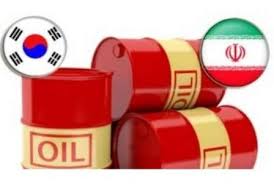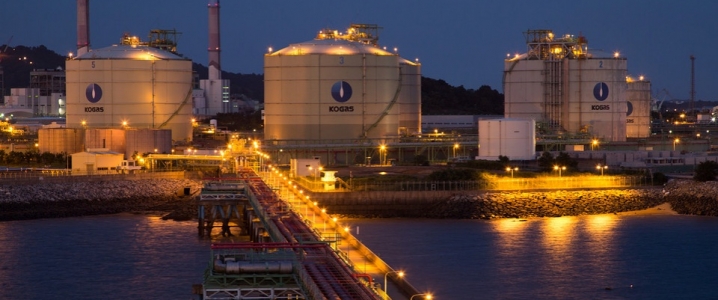
South Korea's Iranian crude imports tumble in August but more US barrels arrive


Asia's fourth-biggest energy consumer has imported 2 million barrels of crude from Iran last month, down 84.2% from 12.63 million barrels received a year ago, latest data from state-run Korea National Oil Corp. showed.
This marks the 10th consecutive decline since November last year when imports from Iran fell 26.8% year on year to 10.37 million barrels. The August imports were also down 67.7% from 6.2 million barrels received in July.
The August shipment of 2 million barrels was the smallest monthly import volume since December 2015 when South Korea received 1.78 million barrels from the Persian Gulf producer during the previous US-led sanctions on Tehran.
Over January-August, Iranian imports fell 42.1% year on year to 58.2 million barrels, compared with 100.44 million barrels in the year-ago period. Following the US decision to re-impose sanctions on Tehran in May, South Korea has since been trying to pare back crude oil shipments from Iran in a bid to secure US exemption.
South Korea, one of the closest allies to the US in Asia Pacific, would be keen to abide by Washington's foreign policies as it requires full US support and influence in its quest to completely denuclearize North Korea and improve diplomatic and economic ties with Pyongyang.
The US has pressed Iran's oil customers, including South Korea, to completely eliminate imports by November 4.
Seoul has called for a US sanctions waiver to keep buying Iranian condensate, saying it is hard to find alternative sources of condensate due to limited suppliers.
About 70% of Iranian crude brought into South Korea is condensate, and more than half of the condensate which South Korea imports come from Iran.
ALTERNATIVE SOURCES
In order to make up for the loss of Iranian barrels, South Korean refiners and petrochemical companies have sharply increased their feedstock intakes from the US and Algeria.
South Korea's imports of US crude jumped almost sixfold to 7.31 million barrels in August, compared with just 1.28 million barrels a year ago, which made the US South Korea's fourth-biggest crude supplier last month overtaking traditional Middle Eastern sources such as the UAE, Iran and Qatar.
South Korean end-users' US crude purchases mostly consisted of light sweet grades like WTI Midland, Bakken, Eagle Ford crude and condensate.
South Korean refiners seem to have purchased more US condensate in August to help fill the loss of Iranian South Pars condensate supply, industry sources said.
"We are seeking alternative sources such as US crude and condensate to help make up for the cutback in Iranian supply," said an official at the country's top refiner SK Innovation that operates a 100,000 b/d condensate splitter at Incheon.
SK Innovation has been buying on average 1 million-2 million barrels of US crude oil every month this year, but the company has yet to purchase US condensate.
For the first eight months, South Korea's imports from the US jumped more than sixfold to 19.7 million barrels, from 3.08 million barrels a year earlier.
South Korea's crude imports from Algeria also jumped more than four times to 4.7 million barrels in August, compared with 1.04 million barrels a year earlier.
Algerian crude cargoes that arrived in August were mostly naphtha-rich Saharan Blend.
MIDDLE EASTERN CRUDE
South Korea's crude imports from its biggest supplier Saudi Arabia fell 4% year on year to 28.74 million barrels in August.
Total imports from Middle Eastern suppliers decreased 21% year on year to 65.37 million barrels last month, which marked the second consecutive decline.
South Korea's Middle Eastern crude intake had fallen for nine months in a row until May. Middle Eastern crude imports rose 10.6% in June but has decreased since July.
Over January-August, imports from the Middle East fell 10% year on year to 561.09 million barrels, compared with 623.53 million barrels in the same period last year, as a result of OPEC-led drive since last year to limit their production in order to balance an oversupplied market.
In total, South Korea imported 94.99 million barrels, or 3.06 million b/d, of crude oil in August, down 6.4% from 101.45 million barrels a year earlier.
This marked the first decrease after rising four months in a row. The August imports were also down 1.7% from 96.67 million barrels in July. For the first eight months, the country's crude imports climbed 1.5% year on year to 749.09 million barrels.


Newmont nets $100M payment related Akyem mine sale

First Quantum scores $1B streaming deal with Royal Gold

Caterpillar sees US tariff hit of up to $1.5 billion this year

Gold price rebounds nearly 2% on US payrolls data

Goldman told clients to go long copper a day before price plunge

Australia pledges $87M to rescue Trafigura’s Nyrstar smelters in critical minerals push

Copper price posts second weekly drop after Trump’s tariff surprise

One dead, five missing after collapse at Chile copper mine

Idaho Strategic rises on gold property acquisition from Hecla

Codelco seeks restart at Chilean copper mine after collapse

US slaps tariffs on 1-kg, 100-oz gold bars: Financial Times

BHP, Vale offer $1.4 billion settlement in UK lawsuit over Brazil dam disaster, FT reports

NextSource soars on Mitsubishi Chemical offtake deal

Copper price slips as unwinding of tariff trade boosts LME stockpiles

SAIL Bhilai Steel relies on Danieli proprietary technology to expand plate mill portfolio to higher steel grades

Alba Discloses its Financial Results for the Second Quarter and H1 of 2025

Australia weighs price floor for critical minerals, boosting rare earth miners

Australia pledges $87M to rescue Trafigura’s Nyrstar smelters in critical minerals push

Fresnillo lifts gold forecast on strong first-half surge

US slaps tariffs on 1-kg, 100-oz gold bars: Financial Times

BHP, Vale offer $1.4 billion settlement in UK lawsuit over Brazil dam disaster, FT reports

NextSource soars on Mitsubishi Chemical offtake deal

Copper price slips as unwinding of tariff trade boosts LME stockpiles

SAIL Bhilai Steel relies on Danieli proprietary technology to expand plate mill portfolio to higher steel grades

Alba Discloses its Financial Results for the Second Quarter and H1 of 2025

Australia weighs price floor for critical minerals, boosting rare earth miners

Australia pledges $87M to rescue Trafigura’s Nyrstar smelters in critical minerals push

Fresnillo lifts gold forecast on strong first-half surge














